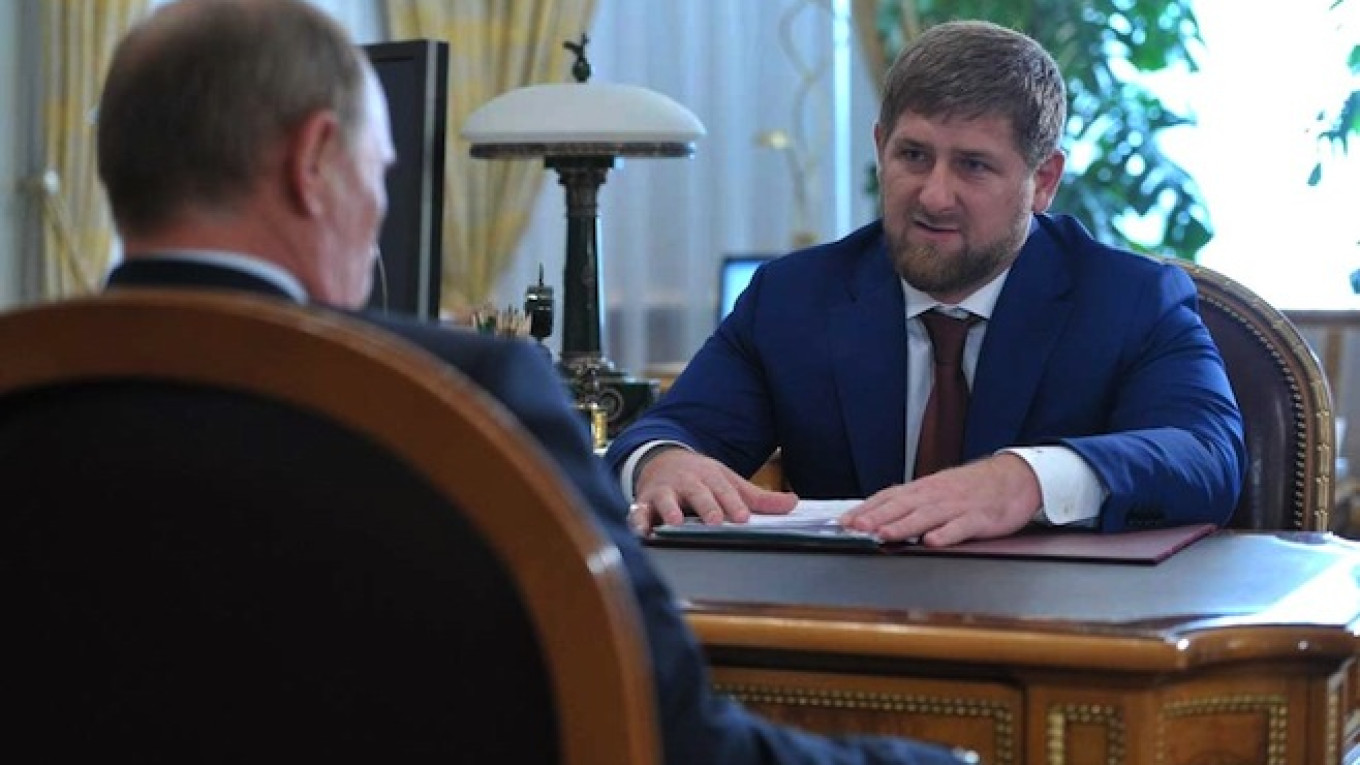Chechen leader Ramzan Kadyrov has described his republic as a “model of peace and harmony” — a claim that ignores a recent attack by Islamic militants, attacks on human rights groups and allegations of widespread torture and kidnappings of dissenters.
“Today Chechnya is a model of peace and harmony,” Kadyrov wrote on the VKontakte social network Sunday. “For many years, there has not been a single conflict of religious or ethnic nature.”
Prior to December 2014, the Russian region had enjoyed years of relative stability under the strong-arm rule of its Kremlin-appointed leader.
However, on Dec. 4, Islamist militants stormed an empty school and publishing house in Chechnya's capital city Grozny.
The fighting left at least 19 people dead, and many others injured, according to initial figures released by the National Anti-Terrorism Committee. Other accounts record higher death tolls.
Following the attacks, Kadyrov called for his supporters to burn the homes of militants' families, and at least 15 homes were torched or razed within the month, according to a tally by human rights group Memorial.
Russian President Vladimir Putin denounced the “extrajudicial settling of scores” during his annual news conference on Dec. 18, but tempered his criticism with an acknowledgement that “as a rule, the relatives of people who commit terrorist attacks are aware of it at least in the vast majority of cases.”
In June, the offices of the Committee Against Torture, a prominent human rights NGO, were attacked by masked men who emerged from a crowd of protesters in Grozny, broke down the door to the organization's office and ransacked the property, forcing employees to escape through a window.
The Committee Against Torture called both municipal and regional police when attacked, but no law enforcement arrived during the attack.
Kadyrov blamed the NGO for inciting the attack, saying that the group's refusal to send employees outside to speak with protesters resulted in the violent destruction of their offices.
“Analysis of the incident gives us reason to conclude that the committee's staff deliberately provoked the incident with the objective of getting attention in the international media and obtaining new American grants,” Kadyrov said on Instagram.
Former senior police detective Alikhan Akhmedov was investigating the death of a police officer and unknowingly questioned a member of the Chechen special police task force (OMON). Consequently, Akhmedov was detained and subjected to torture at the OMON base, he said in the recent documentary “The Family.”
“They beat [prisoners], sometimes beat as if I am a punching bag and they are having a workout on me,” Akhmedov said in the film, whose title refers to Kadyrov's clan. The documentary was released this year by Open Russia, a pro-democracy foundation set up by tycoon-turned-political activist Mikhail Khodorkovsky.
Grigory Shvedov, the chief editor of opposition-minded news portal Kavkazsky Uzel (Caucasian Knot), described Kadyrov's special security agencies as “primarily executioners.”
“If it's needed to torture a significant number of people, they will torture,” Shvedov said in the film.
Kadyrov's praise of Chechnya's “peace and accord” coincided with the Day of the Chechen Republic, also known as the Day of Civil Agreement and Unity, an annual holiday celebrated on Sept. 6.
A Message from The Moscow Times:
Dear readers,
We are facing unprecedented challenges. Russia's Prosecutor General's Office has designated The Moscow Times as an "undesirable" organization, criminalizing our work and putting our staff at risk of prosecution. This follows our earlier unjust labeling as a "foreign agent."
These actions are direct attempts to silence independent journalism in Russia. The authorities claim our work "discredits the decisions of the Russian leadership." We see things differently: we strive to provide accurate, unbiased reporting on Russia.
We, the journalists of The Moscow Times, refuse to be silenced. But to continue our work, we need your help.
Your support, no matter how small, makes a world of difference. If you can, please support us monthly starting from just $2. It's quick to set up, and every contribution makes a significant impact.
By supporting The Moscow Times, you're defending open, independent journalism in the face of repression. Thank you for standing with us.
Remind me later.


